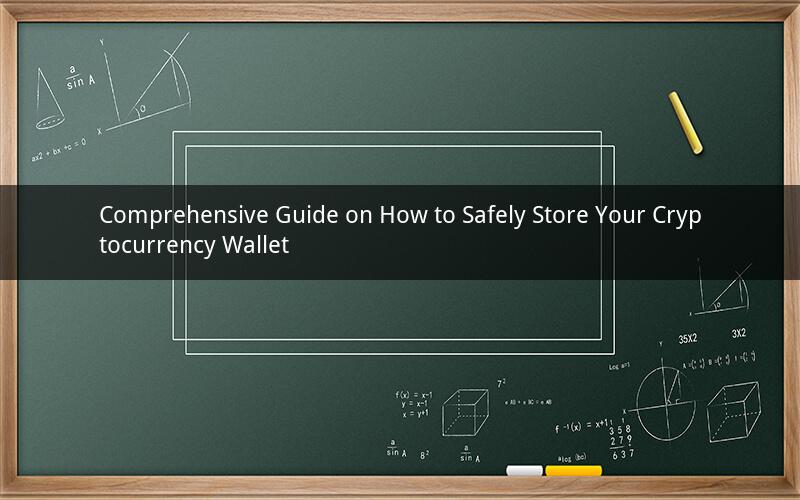
Introduction:
In the rapidly evolving world of cryptocurrencies, securely storing your digital assets is of paramount importance. A cryptocurrency wallet is a digital tool that allows you to store, send, and receive digital currencies like Bitcoin, Ethereum, and Litecoin. With numerous wallet options available, it is crucial to choose the right one and follow best practices to ensure the safety of your funds. This article will provide a comprehensive guide on how to store your cryptocurrency wallet effectively.
1. Understanding Different Types of Cryptocurrency Wallets
1.1 Hardware Wallets
Hardware wallets are considered the most secure option for storing cryptocurrencies. These wallets store your private keys offline, making them immune to online hacking attempts. Popular hardware wallets include Ledger, Trezor, and CoolWallet.
1.2 Software Wallets
Software wallets are digital applications that can be installed on your computer or smartphone. They offer ease of access and convenience but are more vulnerable to online threats. Software wallets can be further categorized into:
a. Desktop wallets: Installed on your computer, providing enhanced security compared to online wallets.
b. Mobile wallets: Available for smartphones, offering convenience and accessibility on the go.
c. Web wallets: Accessible through a web browser, providing convenience but posing higher security risks.
1.3 Paper Wallets
Paper wallets are physical pieces of paper containing your private and public keys. They are considered secure as they are offline, but they are prone to physical damage and loss. It is crucial to store them in a safe and secure location.
2. Best Practices for Storing Cryptocurrency Wallets
2.1 Choose a Reputable Wallet Provider
Ensure that the wallet provider you choose is reputable and has a strong track record in the cryptocurrency community. Research their security measures, user reviews, and reputation before making a decision.
2.2 Use Strong Passwords and Multi-Factor Authentication
Set a strong, unique password for your wallet and enable multi-factor authentication (MFA) whenever possible. This adds an extra layer of security, making it harder for hackers to gain access to your funds.
2.3 Regularly Update Your Wallet Software
Keep your wallet software up to date to ensure that you have the latest security patches and bug fixes. Outdated software can leave your wallet vulnerable to attacks.
2.4 Backup Your Wallet
Regularly backup your wallet to prevent data loss. For hardware wallets, you can create a backup using the provided software. For software wallets, ensure that you have a backup of your private keys or mnemonic phrase.
2.5 Store Your Backup Safely
Keep your wallet backup in a secure location, away from potential physical or digital threats. Consider using a safe deposit box or a secure cloud storage service.
2.6 Be Wary of Phishing Attempts
Be cautious of phishing attempts, where hackers try to trick you into revealing your private keys or login credentials. Always verify the legitimacy of emails, messages, and websites before providing any sensitive information.
3. Additional Tips for Enhanced Security
3.1 Use a Cold Storage Strategy
Cold storage refers to storing a significant portion of your cryptocurrency offline. This can be achieved by using hardware wallets or paper wallets. By keeping a large portion of your assets in cold storage, you reduce the risk of online theft.
3.2 Diversify Your Wallets
Do not keep all your cryptocurrencies in a single wallet. Diversify your storage across multiple wallets, including hardware, software, and paper wallets. This spreads the risk and reduces the impact of a potential breach.
3.3 Educate Yourself on Security Measures
Stay informed about the latest security threats and best practices in cryptocurrency storage. Regularly educate yourself to stay one step ahead of potential attackers.
3.4 Consider Insurance
Some cryptocurrency wallets offer insurance options to protect against theft and loss. Evaluate the insurance coverage and terms before opting for it.
Frequently Asked Questions (FAQs):
1. Q: Can I store multiple cryptocurrencies in a single wallet?
A: Yes, many cryptocurrency wallets support multiple cryptocurrencies. However, it is crucial to research and choose a wallet that supports the specific cryptocurrencies you intend to store.
2. Q: Are paper wallets secure?
A: Paper wallets can be secure if stored properly. However, they are prone to physical damage and loss. Ensure you keep them in a safe and secure location.
3. Q: Can I recover my cryptocurrency if I lose my wallet?
A: If you lose your wallet, you may lose access to your funds unless you have a backup. Ensure you regularly backup your wallet to prevent such situations.
4. Q: How long does it take to recover my cryptocurrency if my wallet is compromised?
A: The time it takes to recover your cryptocurrency depends on the nature of the compromise and the wallet provider's response. It is crucial to act quickly and follow the wallet provider's instructions to minimize the impact.
5. Q: Can I use a cryptocurrency wallet for everyday transactions?
A: Yes, you can use a cryptocurrency wallet for everyday transactions. However, it is essential to choose a wallet that offers convenience, security, and supports the cryptocurrencies you intend to use.